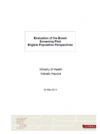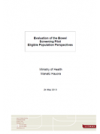This report from Litmus looks at the experience of bowel screening pilot participants. As well, it contains qualitative research into Māori and Pacific populations that did not take up the opportunity to be screened and explores the barriers to participation.
Both qualitative studies offer useful insights into the perceptions, attitudes and behaviour of participants and non-responders.
This report shows that overall, people that took part in the pilot had a positive experience of the bowel screening pathway. Participants summarised their experience as convenient, easy to do, with timely results and progression along the pathway.
Participants who had a positive iFOBT result felt the communication about their results was reassuring and the stage relating to their colonoscopy was flexible, timely, and respectful.
However the report found that bowel screening and the current screening pathway is not acceptable to some Māori and Pacific people and this has implications for ensuring fair access to the bowel screening pilot.
Purpose
The Ministry of Health has commissioned Litmus and Sapere Research Group to evaluate the Bowel Screening Pilot. Information gained through the evaluation will help determine whether a bowel screening programme should be rolled out nationally.
Methodology
Methodology
Participant pathway study: 12 face-to-face indepth interviews were conducted with purposively selected BSP participants covering different stages of the BSP screening pathway: four Māori, four Pacific and four Pākehā. Interviews were conducted between 19 and 21 September 2012.
Research with non-responders: 12 face-to-face interviews were undertaken with six Māori and six Pacific people who had received a pre-invitation, invitation and reminder letter between April to September 2012, had not returned a completed kit, and had not contacted the Coordination Centre to opt out of the BSP (non-responders). Interviews were conducted between 3 and 7 December 2012.
Both studies followed opt-out recruitment and informed consent procedures. Researchers and participants were ethnically matched. Participants were invited to bring a support person, and received a koha of $50.
Both qualitative studies offer useful insights into BSP participants’ and non-responders’ perceptions, attitudes and behaviour related to the BSP. However, it is acknowledged the relatively small number of interviews in each study means the research does not cover the diversity of all eligible population sub-groups. While the studies have identified the major themes in relation to BSP participants’ pathway experience, and the major reasons and barriers for Māori and Pacific non-responders not taking part in the BSP, other experiences and barriers are likely to exist.
Key Results
This report shows that overall, people that took part in the pilot had a positive experience of the bowel screening pathway. Participants summarised their experience as convenient, easy to do, with timely results and progression along the pathway. Participants who had a positive iFOBT result felt the communication about their results was reassuring and the stage relating to their colonoscopy was flexible, timely, and respectful. However the report found that bowel screening and the current screening pathway is not acceptable to some Māori and Pacific people and this has implications for ensuring fair access to the bowel screening pilot.


